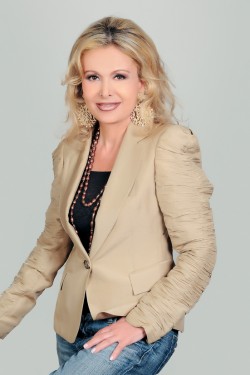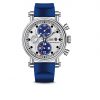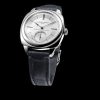Prestige issue 206, September 2010
From 1973 to 1986, Gaby Lteif achieved success after success, becoming the symbol of a whole generation. Presenter of programs on Télé Liban, she illuminated for years the small screen, with her angelic face, her warm voice, and great culture. The Lebanese war has hindered unfortunately her«oriental destiny». She moved to France in 1986 to integrate Radio Monte Carlo. Journalist, she has hit shows. From Literature to poetry, visual arts, music, theater, cinema, her guests were major players in the socio-political reality of the two shores of the Mediterranean, an interesting intercultural dimension.
Gaby Lteif in Paris. © Archives Gaby Lteif
Tell us about your childhood. Native of Deir el Qamar, I was born in Achrafieh, Beirut. The silence was my companion as well as loneliness at the Sisters boarding school, away from my family, pronounced contrast with my future lively and warm personality, two traits which go against the world of my childhood. Silence repaired by words, loneliness through the crowd. I always dreamed of being a writer. However, the TV and radio are major events that have settled in my life by chance. A «fusion» state binds me to these two media, while it was hardly my initial goal. At 18, I decided to go to France to study philosophy and psychology at the Sorbonne. My commitment to these disciplines is also reflected in my interviews marked with a deep atmosphere, where psychology plays a good place. But as my family changed their mind at the last moment, I missed my trip to Paris.
How did you come on TV? Pure chance led me to follow a session organized by TéléLiban, training TV presenters. At that time, I was very trendy, I was listening to French music, English, and I loved the hippie style … I passed the test, and followed a course of three months. Engaged in the TV world at 18 years old, I decided to improve my knowledge by enrolling in the Faculty of Information and Documentation at the Lebanese University, journalism section. Until my graduation, I studied and I worked together. My career started well. I was happy, full of life, full of projects. And then, suddenly unfortunately the war broke out two years later, all my dreams have collapsed!
Why did you decide to leave Lebanon? I overcame war for eleven years, under the bombs and explosions. We had to move several times, like everyone else, everywhere in Lebanon. I’d almost died several times as all Lebanese. I could not live this drama between the smile on TV, and the bombs falling. This forced me to accept the proposal of Antoine Naufal, director of information and programs on Radio Monte Carlo Middle East at the time, to join the team of this radio in Paris. In 1986 I left Lebanon to France via Cyprus, counting to be back in my country a year later. However, when we leave, we must build, and also leave our marks wherever we are. So I started a new procedure, a new life, as many Lebanese of my age, my generation, who are everywhere in the world.
You had the chance to live in Paris … I think I was destined to go into the world, and especially in France. My destiny took me to Paris where I found myself. Living in France is the only major decision I’ve made in my life. I’ve always loved this country, because when I was born, my mother gave me the name of Gaby,after her French friend. French speaking entered my life very early. I carry it within me, alongside culture and the Arabic language. I obviously got lucky because Paris opened my doors around the world, not just Europe and the Western world. I even discovered the Arab world from France, and Radio Monte Carlo. I dreamed of doing my doctorate in Paris, but I had to build myself, and adapt to the new pace of work. Later, I did studies at the Sorbonne, where I obtained a Master 2 in cultural journalism. It was really great.
In fact, most of your interviews are with a cultural theme. My path allowed me to be confronted with different cultures on both shores of the Mediterranean, those of the East and the West. Every person who lives in the West, and particularly in France, has a role to play. Mine is to be a bridge between two cultures, between the Arab world and the Western world, including France and Lebanon. I’m in France since twenty-four years, and the Arab cultural atmosphere has evolved. Arabs and Lebanese residing in France are organizing very interesting events that animate the Parisian nights at Unesco, the Arab World Institute, and in various Arab cultural centers. It’s impressive. We could not have imagined that twenty years ago.
© Archives Gaby Lteif
Tell us about your hit show «The Other side». In Paris, I had the opportunity to present at Radio Monte Carlo Doualiya emissions of my dreams, the ones I would have liked to achieve in my country, and get close to personalities from around the globe. I have interviewed hundreds during my show «the other side» that was broadcast on the waves from 1997 until 2001. For purposes of this «timeless»program, I traveled to Arab countries and Lebanon to meet key figures from the political and literary world. My first goal was to reveal to the audience the other side of my various interviewed personalities, each of us having several facets.
Does Gaby Lteif also have several facets? Since I worked on TV very early, a facet of my personality became public, while my other facets were really unknown. Spectators found me radiant, while I had questions and doubts. I’ve always wondered about existential questions. I am a person who always challenges, hypersensitive, I try to understand, to know… So I was always attracted to complex characters, able to overcome all obstacles and difficulties scattered on their path. Apparently I wanted to know myself through others. I had the chance to meet leading figures, those who have left exceptional marks on the cultural, political and social life.
Why did you decide to publish a selection of your interviews in the book «Marks on the air»? I wanted to unveil these hidden treasures. I want to revive my interviews, since the new release ends upon publication. These talks are not scoops, they are parts of life, destinies that I wanted to share with readers. The opportunity presented itself at the event: «Beirut World Book Capital». And since I’m writing my own experience, my life, my journey between Beirut and Paris, I wanted to shed light on these figures, before talking about myself. In fact, my experience is certainly a part of my memory, but also that of Radio Monte Carlo.
Is your public side so different from your other side? (Laughs). They complement each other as fire and light (she says it in Arabic, nar and nour). In fact, I do not like to define myself, and I have not even had the opportunity to do so. It is true that I was for a long while on television, for thirteen years, on the radio too, but I have not had time to continue my mission in Lebanon, I continued in France. The breaking of departure is my greatest injury.
Tell us about your various radio broadcasts. I led live and in public the Round Table at the Literary Café of the Arab World Institute in Paris for nine years, and the Friday lounge, a French-Arab cultural and artistic show that I presented live from the Royal Monceau hotel in Paris for nine years also. I received as part of this prestigious magazine, guests representing the cultural and artistic melting pot. Among my other programs on Radio Monte Carlo, I also quote Backstage of the Arab media. I currently have two programs: No Mask, which tends to explore the different facets of personalities from the political, cultural, media and art, and Parisian Salon, which wants to bridge the cultural and artistic events in Paris and those of Arab world. During my career, I interviewed a large number of intellectuals, men of culture, and Arab artists, but also personalities from the French cultural world. In fact, I carry a political message through culture, that of dialogue that leads to peace.
What was the best day of your life? This may be the day when I received the award for the Female Success in 2006, at the French Senate, in the presence of my mother and godmother, also the ambassador of Lebanon to France, HE Sylvie Fadlallah. There were ten women winners worldwide. I was very moved, because Lebanon was living that year a hellish period. Besides, I was torn. I’ve never had a real happiness. In Lebanon, I did not have time to breathe because of the war and, in France, I was always torn between France and Lebanon.
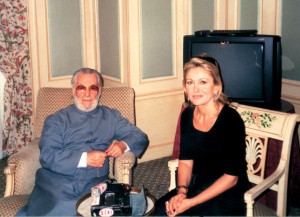
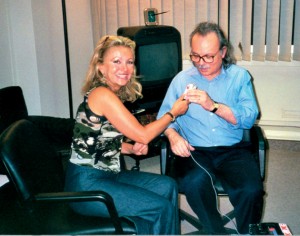
What do you regret most? Lebanon war.
Tell us some anecdotes from your interviews. Omar Sharif told me that he has become international because of his weight. When he was a kid, he was obese. His mother put him in an English school, as the English at the time were known for their junk food. And it is there that he learned English, which helped him become international. The famous poet Adonis was plowing and cultivating the land until the age of 13, for years he has lived in Lebanon: «Lebanon is like love constantly hatching» he said. The poet, philosopher, Ounsi el Hage lost his mother at the age of 8 years, this deeply affected him, and made him passionate about justice, «it’s an obsession without pity» for him. Zaki Nassif was sick when he was young. The children were playing, and he could not. Suffering from deprivation, he watched the people, contemplating life around him. His mother had a beautiful voice was stern «she had a hard hand». Among other personalities I interviewed the Patriarch Michel Sabbah of Jerusalem I met in Paris. The suffering of the Palestinian people can be read on his face, including the virtual absence of Christians in the land of Christ! When interviewing Boutros Boutros-Ghali, for example, I had the impression of living with the UN, with Egypt. The famous Foreign Minister Fouad Boutros, had summed up the relation of culture to politics: «When culture mingles with the power it loses an important aspect of its role». Everyone has a story. To summarize the lives of my interlocutors, their experiences, the scenes of their lives, is a very interesting experience, very rewarding.
Have you faced intimidating situations during your interviews? I went to interview the Patriarch Ignatius IV Hazim at the Hotel Royal Monceau in Paris. He received me warmly, I was really happy. I tried several times to operate the recorder. In vain! His Holiness said, «Stay, we will discuss and come back tomorrow for the record». We talked a lot. I asked him many questions about life, loneliness … For me, this meeting was a life lesson. The next day I came back, and we recorded the interview. Interview by MARCELLE NADIM



